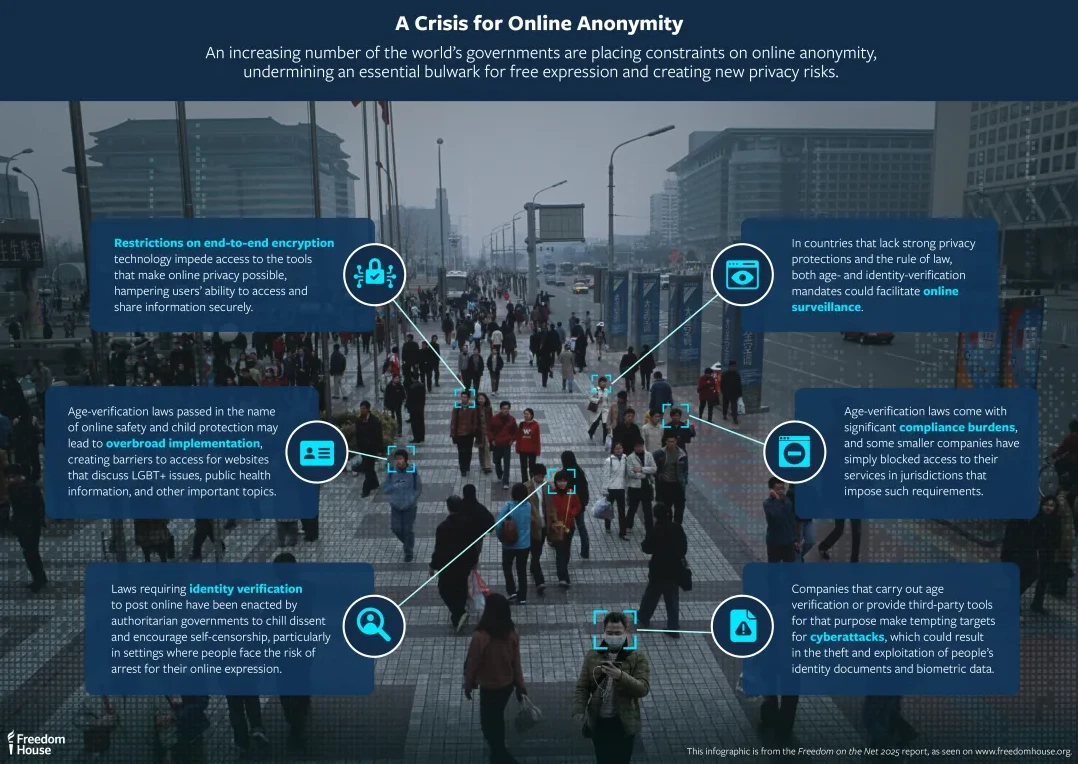The internet isn’t free: Shutdowns, surveillance and algorithmic risks
Global internet freedom has declined for the 15th straight year, according to the latest Freedom House report. Out of 72 countries evaluated, 28 recorded declines and 17 saw improvements.
Shutdowns hit high-stakes zones
The report documents large-scale infrastructure used to silence dissent and disrupt connectivity. For example, in Kenya authorities shut down internet access for roughly seven hours during protests in June 2024, and arrested hundreds of participants. Authoritarian states such as China and Myanmar remain the worst rated for internet freedom. In these settings governments expanded censorship tools, increased surveillance of electronic communications and issued tougher sentences for online dissenters.
For CISOs of global firms these moves raise supply chain risks, potential data-access disruptions, and complicate business continuity across regions. Remote offices, third-party services or cloud dependencies in impacted jurisdictions may face unexpected connectivity gaps or regulatory intervention.
Surveillance and civil society under strain
Authoritarian governments are expanding control, and democracies are slipping in their efforts to protect digital rights. Among the 18 countries designated “Free” in the report, half suffered score declines in the assessment period (June 2024-May 2025). Georgia, Germany and the United States registered the steepest changes in this cluster.
The report highlights a key indicator: “online sources of information are manipulated by the government or other powerful actors” and notes it “has undergone the most consistent global decline over the past 15 years.” Common methods include paid commenters posing as private users, AI-generated misleading content, and influencers posting pro-government content without transparent affiliation.
An environment where discourse is manipulated, identities are obscured and digital trust is eroded means increased exposure for brand reputation, insider threats and social engineering.
Algorithmic influence and anonymity in retreat
The research draws attention to how advances in technology are deepening control over information and identity. The report states “online anonymity has long been a bulwark for free expression and access to information.” It describes how governments across both liberal and autocratic systems are implementing identity verification requirements, weakening encryption and demanding platform data access.
In democracies such as Germany and the U.S., laws and regulations are beginning to erode safeguards: encrypted apps face legal intervention, age and identity verification are being mandated for access to services, and satellite-based connectivity faces pressure to comply with censorship and surveillance regimes.
From a CISO perspective the erosion of anonymity and encrypted channels has direct implications for user privacy, data protection, and trust models. When private comms are subject to state or platform intrusion, enterprise controls must account for a shifting risk landscape.
What the trends mean for enterprise security
This report offers four take-aways for CISOs and security teams operating in a global context:
- Operational resilience: Internet shutdowns and connectivity throttles are now more common and can affect remote offices, cloud access or regional operations.
- Supply chain and third-party risk: Vendors, service providers or partners in jurisdictions prone to network controls may face hidden risks.
- Information integrity and social engineering: Growing manipulation of online narratives and identities means attackers can exploit reputational channels, impersonate insiders or abuse trust.
- Privacy and identity risk: Regulatory and state pressure on anonymity and encryption increases exposure for corporate data flows, platform trust models and user privacy.
